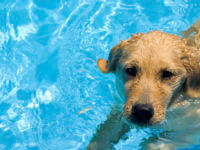Midnight is only five years younger than I am, so her veterinarian had already warned me about the prevalence of chronic renal disease among senior cats. But while Midnight’s diagnosis was not shocking, that didn’t make the news any easier to hear. Because she had not yet shown any of the symptoms I was watching out for, I hadn’t expected her to develop a kidney problem yet.
Chronic renal disease occurs when a cat’s kidneys become unable to function normally over time. Like Midnight, cats who are in the early stages sometimes don’t show obvious symptoms and the signs only appear in lab work. Other cats who have reached the later stages may urinate more frequently than usual or experience loss of appetite, nausea, and dehydration. Midnight’s vet assured me that while renal disease is irreversible, there are ways to slow kidney damage, treat the symptoms, and keep Midnight comfortable.
She explained the first step was to transition Midnight to a wet low protein prescription diet which would be much easier on her kidneys than regular cat food. I assumed this new diet would be a magical solution that Midnight would somehow telepathically understand so I immediately switched her food. Of course Midnight loves wet food! I thought. And she needs it right now, so I’ll just give her this new food instead. She won’t mind. But after only a few days, she grew tired of every single flavor of wet kidney diet I could find and absolutely refused to eat until I brought back her old food.
I called Midnight’s vet clinic in desperation. “Is there any other option?” I nearly begged. The technician explained that the prescription food is the most effective way to help Midnight’s kidneys and encouraged me to not give up quite yet. She suggested we try to see if Midnight prefers the dry food instead of the wet food. I hadn’t tried the dry food yet (and the chances of me successfully convincing Midnight that she needed to learn to like the wet food were slim), so I stopped by the vet for a new bag and crossed my fingers that I would have better luck. The technician told me a slow transition could prevent a hunger strike instead of immediately removing her old food. On the first day, I fed her the majority of her normal food with only a very small amount of the kidney food. Each day, I increased the kidney food a tiny bit more and fed her less of her normal food. I aimed to make the transition as gradual as possible to avoid upsetting her.
One baby scoop by one baby scoop at a time, Midnight finally ate her kidney diet just as much as she ate her old food. While a prescription diet does not reverse the effects, it helped make Midnight’s renal disease easier to manage by reducing her protein intake. Midnight’s recheck lab work proved that the new food was indeed helping— her kidney levels looked even better than we expected.
Feline chronic renal disease occurs when a cat’s kidneys are unable to function normally over a period of time. Chronic renal disease can be difficult to recognize during the asymptomatic early stages, and remaining up to date on wellness appointments can allow early and effective treatment. A prescription kidney food can help slow down additional kidney damage by providing a low protein diet.



